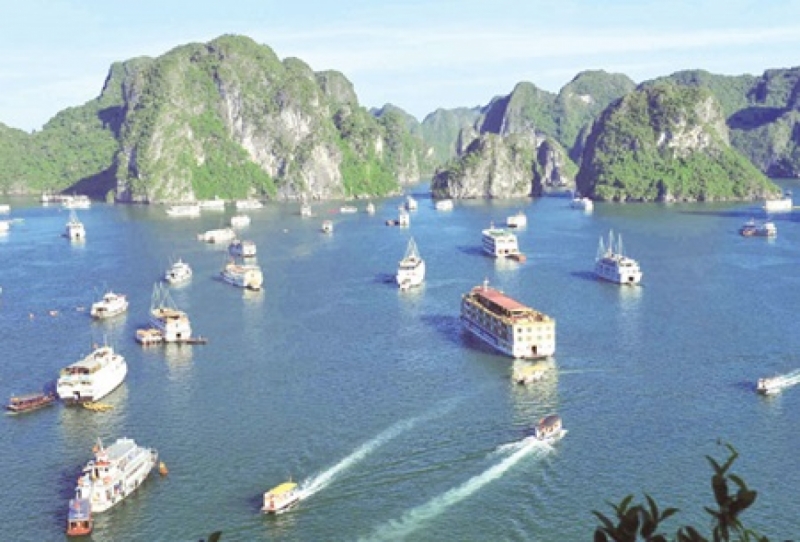




From Viet Nam News
DA NANG (VNS) — Ministers of country members of Partnerships in Environmental Management for the Seas of East Asia (PEMSEA)'s council yesterday discussed a final statement for the East Asian Seas Congress 2015 in Da Nang which set new goals towards a sustainable ‘blue economy'.
Following agreements on the Sustainable Development Strategy for the Seas of East Asian (SDS-SEA) in 2003, the countries have conducted their own policies and practical programmes based on their common goals.
"This is to review the compliance of members toward the strategy," said the final statement released by Vietnamese Deputy Minister of Natural Resources and Environment Chu Pham Ngoc Hien.
"We have also outlined new goals and a roadmap for members to follow in the next five years," he added
During discussions at the congress, members, including Japan and Singapore, said they had made progress with integrated coastal management and the conservation of marine resources. However, other members such as Timor Leste had not found a way to address coastal ecological problems and called for assistance.
In Japan, severe coastal pollution and the disappearance of coral had been major problems. However, since 2007 a thorough integrated coastal management plan has been applied along the country's coast.
"That has made strong progress to revive ecologies in the bays of Tokyo, Ise and Osaka," said a Japanese representative at the forum yesterday.
A Singaporean representative said all waste water was being treated under tight regulations before it was discharged into the sea so pollution was no longer a problem.
According to the Timor Leste delegate, oil and tourism were among the key economic sectors in the country. This and low awareness of sustainability had led to less focus on integrated coastal management, he said.
"80 per cent of our population are farmers living in rural areas who are unaware of integrated coastal management," he said, adding that the country lacked the manpower to implement the task.
He called for experience sharing in the field from countries including Viet Nam, Japan, South Korea and China.
Laos raised the same call, saying they were struggling with water resource management.
Most representatives hailed their co-operation and solidarity in their joint efforts to reach these goals and a sustainable ‘blue economy'.
The 5th Ministers' Forum agreed to set four new goals:
By 2017, a self-sustaining PEMSEA Resource Facility managing and co-ordinating a range of products, services and financing mechanisms for advancing SDS-SEA implementation at regional, national and local levels.
By 2018, a regional State of Oceans and Coasts reporting system to monitor progress, impacts and benefits, and to continually improve planning and management of SDS-SEA implementation.
By 2021, national coastal and oceans policies, and supporting legislation and instructional arrangements set up and functional in 100 per cent of PEMSEA Partner Countries, consistent with international environmental and sustainable development commitments and based on the best available scientific information.
By 2021, integrated coastal management programmes for sustainable development of coastal and marine areas covering at least 25 per cent of the region's coastline and contiguous water shed areas, supporting national priorities and commitments under the United Nation's Sustainable Development Goals, UN Framework Convention on Climate Change, Aichi Biodiversity Targets, UN International Strategy for Disaster Reduction Post-2015 Framework for Disaster Risk Reduction, and other relevant environmental and sustainable development targets subscribed to PEMSEA Partner Countries.
The congress ends today after participants take part in a field trip to look at the achievements made in coastal management by Da Nang.
Marine environment
Marine pollution has threatened two core marine economic industries – aquaculture production and tourism – and Viet Nam's ‘green growth' goal.
Deputy Minister of Viet Nam Natural Resources and Environment Chu Pham Ngoc Hien made the remarks at the final session of the fifth East Asian Seas Congress.
He said damage to the marine environment had resulted in mass losses in many aquaculture centres in coastal provinces.
"Protection of the marine environment and restoring coral reefs, sea weed and ecology systems will be crucial factors to help Viet Nam's efforts for sustainable ‘green' economic development," Hien said.
"We need to raise awareness on protecting the environment and stopping littering in rivers the coast and on land."
At the final session, Professor Wong Poh Poh from the University of Adelaide, Australia, said the Implementation of Coastal Management (ICM) at local, national and regional levels had been made to improve governance and management of coastal and ocean areas and related resources, as well as sustainable economic growth and social benefits.
He said innovative applications of ICM would be presented, including governance partnerships with local communities, the business sector and scientific communities, biodiversity ad habitat conservation, alternative livelihood development, water resources and pollution management.
During the four-day discussions, participants from nations in the East Asian Seas agreed to a series of matters including the implementation of the United Nations Convention on the Law of the Sea (UNCLOS), sustainable development goal and managing risks of climate change and disasters in the region.
Deputy Minister Hien also said deputies had agreed to improve the management of coastal areas and strengthen co-operation at national and regional levels.
"We will build a strategy for development and protection in East Asia Seas," Hien said.
"The Congress also heard recommendations about the application of mechanisms and international conventions, and a national action plan in line with international law," he said.
Cambodia will host the 6th East Asian Seas Congress in 2018. — VNS